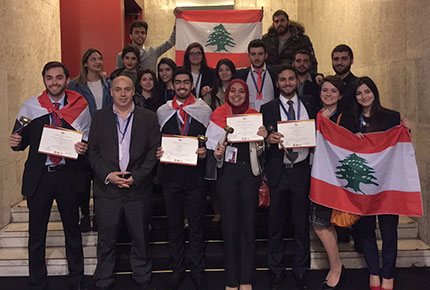LAU delegates win big at Harvard MUN conference in Rome
Over a decade since its inception, the Global Classrooms LAU MUN program continues to garner admiration from students and participants alike.

Finance major Youssef Taher, industrial engineering major Angelo Khoury, international affairs major Ameer Alsamman and economics major Chadwa Alaa all won diplomacy awards in Rome, while political science majors Sandrine Frem and Christie Maike received verbal commendations.
The LAU delegation of 20 students made up less than one per cent of the 2,400 students from universities around the world at the 2016 Harvard World Model United Nations conference in Rome, and yet they took home over three per cent of the awards handed out over the five-day event.
“It was a great chance to showcase the strength of our Global Classrooms LAU MUN program and prove that we can attain impressive results on an international level,” boasted Youssef Taher, a finance major whose skills as a delegate representing Saint Lucia on the ‘Community of Latin American and Caribbean States’ committee in Rome earned him a certificate and gavel.
“The Harvard conference is the only opportunity for us university students to be delegates,” explains Taher, a trainer with LAU’s MUN program. Most of the LAU delegates to Rome are actively involved in the university’s decade-old MUN program.
“With our participation in the Harvard conference we continue a tradition started by the political science department in 2002,” explains Elie Samia, director of the GC LAU MUN and the university’s assistant vice president of Outreach & Civic Engagement. Political science majors made up half the delegates selected from among the dozens of students who applied to join the LAU delegation to Rome. “The Harvard MUN experience builds the intellectual competencies of our students and teaches them how to negotiate in a multicultural context.”
International affairs major and GC LAU MUN trainer Ameer Alsamman agrees. “It was a really good experience. Even if you have a certain world view, you have to adapt it to defend positions you wouldn’t in real life,” explains Alsamman. Together with economics major Shadwa Ibrahim, Alsamman represented Qatar in the ‘Organization of the Islamic Cooperation’ committee. Their preparedness and ability to defend their designated country’s position won them the much sought-after diplomacy award.
“We worked well together. Ameer’s expansive knowledge of politics coupled with my expertise in statistics and the many hours we spent researching and preparing our arguments worked in our favor,” says Ibrahim, who found herself working with Alsamman after they individually expressed an interest in joining the committee to discuss the topic of funding terrorism. “I can’t name one topic affecting today’s politics and nation relations more that terrorism. Our own Arab nations are greatly affected by it,” says Ibrahim, an Egyptian national who earned a Tomorrow’s Leaders Scholarship to study at LAU.
Alsamman chose LAU following his experience with its MUN program while a student at Brummana High School. “I knew the political science program here was strong, but the MUN program definitely sealed the deal for me. The LAU MUN culture is truly captivating,” he says enthusiastically. An active member of the program, Alsamman trains high school students from across the country. “I teach the students diplomacy and public speaking, and guide them through the schematics of the United Nations. I hope they take what they learn and apply it to their lives. Diplomacy works, and we need more of it, especially in our region.”
More
Latest Stories
- This Summer: Robotics and Artificial Intelligence Summer School for Middle Schoolers
- Into the Psychology of Justice
- Alumnus Zak Kassas on Navigation, Spoofing and the Future of GPS
- Hearing Between the Lines
- LAU Hematology Conference 2025: Advancing Science Through Interdisciplinary Exchange
- Dr. Chaouki T. Abdallah Invested as LAU’s 10th President
- LAU Guides Its Students Through the Code of Conduct
- Innovative Procedure at LAU Medical Center–Rizk Hospital Signals Hope for a Patient With a Congenital Disease

